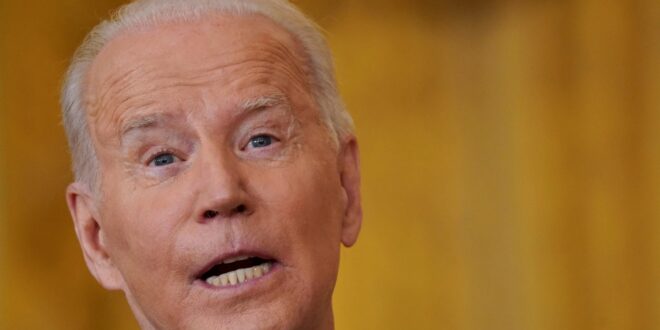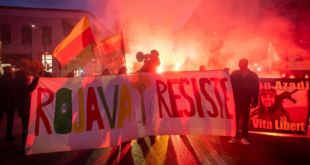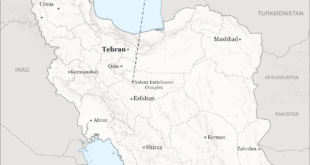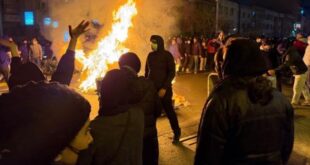On the menu today: President Biden’s comment about minor incursions by Russian forces into Ukraine is a big deal, much bigger than he realized when he said it — another indication that vast swaths of the American foreign-policy cognoscenti really are unable to understand Vladimir Putin. Elsewhere, Greg and I have a wide-ranging conversation with former senator and vice-presidential nominee Joe Lieberman, and a quick rundown of what’s actually in the Freedom to Vote: John R. Lewis Act.
A Major Mistake about a ‘Minor Incursion’
Yesterday afternoon, President Biden stood before the world and declared that, “I think what you’re going to see is that Russia will be held accountable if it invades. And it depends on what it does. It’s one thing if it’s a minor incursion and then we end up having a fight about what to do and not do, et cetera.”
You probably heard a lot of people reacting strongly to Biden indicating that the U.S. and NATO responses may not be quite so strong if Russia only makes a “minor incursion” into Ukraine. To understand why so many people reacted strongly, you need to know about the “little green men.” Not Martians, but the first wave of Russian military forces, crossing over the Ukrainian border and secretly beginning operations in February 2014:
The Ukraine crisis has seen an interesting phenomenon: the appearance in Crimea and eastern Ukraine of seemingly professional soldiers in Russia-style combat uniforms with Russian weapons but without identifying insignia. Ukrainians coined the term “little green men” when such soldiers first manned roadblocks and seized strategic points on the Crimean peninsula.
The little green men turned up in Crimea at the end of February. When asked at a March 4 press conference about the soldiers and their Russian-style combat fatigues, President Vladimir Putin denied that they were Russian, calling them “local self-defense units.”
The truth soon came out. On March 28, Putin congratulated Russian officers in the Kremlin for their conduct of the Crimean operation. The Russian Defense Ministry issued a victory medal for the “return of Crimea.” In a May 18 telethon, Mr. Putin acknowledged that the troops in Crimea were Russian.
In the same telethon, the Russian president denied that the soldiers who in April had begun seizing buildings in eastern Ukraine were Russian. While many of the armed separatists in Donetsk and Luhansk undoubtedly are local, some have looked and handled themselves a lot like the little green men/Russian soldiers who so efficiently took control of Crimea.NATO itself later realized that Crimea was a key demonstration of Russia’s strategy of “hybrid warfare” — ambiguous combinations of kinetic operations (sending troops, blowing things up) and non-kinetic operations (cyberwarfare, propaganda, economic pressure, exacerbating existing tensions in a target state): “Russia invaded Crimea in 2014 and achieved its objectives by virtue of conflating ‘deniable’ special forces, local armed actors, economic clout, disinformation, and exploitation of socio-political polarisation in Ukraine.”
“Minor incursions” are a key chapter in the Russian military playbook. As noted last month, the brilliant British sitcom Yes, Prime Minister had a hilarious, and painfully accurate, description of “Salami Tactics” — a Soviet invasion completed small slice by small slice. No one particular Russian action is likely to spur a full response from NATO. Like the frog in the boiling water, the strategy is to gradually increase aggression and incursions, bit by bit, so that the shift from non-war to war happens so gradually, we never quite realize it. And by the time we do realize it, the Russians have a huge head start.
This is why so many people reacted with horror when President Biden implied yesterday that there might not be such a strong reaction to a “minor incursion” by Russian forces. A “minor incursion” is exactly how the Russian strategy to seize portions of Ukraine would begin. Biden did not intend to give Putin a green light, but Putin is likely to interpret that comment as a green light.
Thankfully, some correspondent asked Biden to elaborate on his remarks. And then, for better or worse, President Biden gave a painfully honest answer:
They have FSB [Russian intelligence] people in Ukraine now trying to undermine the solidarity within Ukraine about Russia and to try to promote Russian interest. But it’s very important that we keep everyone in NATO on the same page. And that’s what I’m spending a lot of time doing. And there are differences. There are differences in NATO as to what countries are willing to do depending on what happens — the degree to which they’re able to go.
And I want to be clear with you: The serious imposition of sanctions relative to dollar transactions and other things are things that are going to have a negative impact on the United States, as well as a negative impact on the economies of Europe as well, and a devastating impact on Russia. And so, I got to make sure everybody is on the same page as we move along.It is not a giant secret that NATO is not united about what to do concerning Russia’s threatening posture toward Ukraine. (Somewhat good news: British flights with arms for Ukraine were not barred from flying over Germany; The Royal Air Force just decided to reroute those flights because the planes were carrying dangerous items such as ammunition, and it would have taken too long to apply for special clearance.) But it’s one thing for NATO to have internal divisions, and another thing for the president of the U.S. to stand before the world and declare that, “There are differences in NATO as to what countries are willing to do depending on what happens” — and to confirm that economic concerns are making our European allies reticent.
There’s an odd schizophrenia in the thinking of the Washington foreign-policy elites — a group Biden has been a member of for several decades. Vladimir Putin is accurately denounced as “a killer,” a brutal dictator, an aggressor, and a threat to European and world stability. But U.S. leaders also keep treating Putin as if he’s a reasonable, rational world leader who will give up his wicked ways if we just put the right offer on the table.
Former national-security agency analyst and counterintelligence officer John Schindler’s latest column is terrific and worth reading in full, but these sections are particularly insightful:
The painful truth is that the foreign policy mavens who are driving American diplomacy right now are largely the same cast of characters who failed to stop (or even understand) Putin during the two terms of the Obama administration. These are all book-smart people with impressive degrees on the wall, yet who understand little about how the world really works. They came of age during the post-Cold War period of unchallenged American hegemony, when foreign policy gurus assured them that “soft power” was the wave of the future and major wars were no more. Their European equivalents are, if anything, even less reality-based, as witnessed by the unilateral disarmament of most of European NATO since the 1990s. At the Cold War’s end, the West German Army possessed a dozen active divisions with 36 brigades and some 50 tank battalions; today the Bundeswehr has three divisions (on paper) with 7.5 brigades and six tank battalions (until recently, just four). Who needs tanks when the toughest issue you ever expect to confront is tidying up agricultural subsidies in Brussels?
To such elites, all of whom fall on the spectrum of Western Educated Industrialized Rich and Democratic, WEIRD for short, Putin represents an atavism whose motivations they cannot understand. The Kremlin strongman adheres to a distinctly throwback view of international relations where the use of force is normal, and countries protect their national interests unapologetically, with all the instruments of national power. Putin’s wholehearted embrace of religiously-infused nationalism, which boasts a venerable history in Russia, leaves WEIRDs befuddled yet has real resonance among average Russians. Western doubts that the former KGB man has “a personal relationship with Jesus Christ” miss the point, but then the West has never understood Russian Orthodoxy very well. No matter what Putin really believes, his public embrace of religiously-grounded national conservatism provides his regime with an ideological anchor, one which happens to view Ukraine’s subservience to Russia as a spiritual as well as geostrategic necessity. . . .
Moreover, what does short-term economic pain matter when compared to the benefits of bringing Kyiv to heel with military force? For Putin, humiliating Ukraine with a “shock and awe” offensive would reduce Kyiv to Moscow’s vassal, thereby showing NATO to be impotent, while bringing down the curtains on American global hegemony. This would halt any further NATO expansion while showing Russia to still be a great power demanding respect, plus reuniting historic Rus for Holy Orthodoxy, thereby guaranteeing that Putin someday will be remembered by the Russian Orthodox Church forever as Saint Vladimir the Great.That’s what seems so painfully clear at this moment. Not only do the leaders of NATO not seem able to deter Vladimir Putin, they seem to barely understand what motivates him. Does this former KGB officer seem like a man intimidated by the prospect of economic sanctions?
The Return of Good Old Joe-mentum
In the eleven-year history of the Three Martini Lunch podcast, Greg and I have now had . . . two guests. Our second-ever special guest was former four-term senator and 2000 Democratic vice-presidential nominee Joe Lieberman. (I knew the show was going to be good when Lieberman, without being asked, started doing a William F. Buckley impression.) And we asked Lieberman about Russia, Ukraine, and Vladimir Putin:
The Biden administration has been talking tough with Putin, threatening actions, which are significant, both economic and military — although I think they could even threaten and do more. But the question is, does Putin believe them? And this is in the context of just one year of the Biden administration, but in foreign policy, the most noteworthy, and in my opinion, terrible event was the retreat from Afghanistan. . . . The war was over, we were just there, performing a kind of counterterrorism/moral-support role. And so it was a mistake to pull out, but it was also done in a way that was embarrassingly chaotic. And I think the people like Putin and Xi Jinping, and maybe people like the supreme leader of Iran Khamenei, saw two things: ‘The Americans are no longer willing or even able to be global leaders. They don’t really want to be, but Biden, and Biden wants to focus on domestic policy. So let’s seize this moment of opportunity and expand our own spheres of influence and control’. And so I think Putin is testing Biden right now. And it’s critically important for American security and world security, that the Biden administration does not blink.Lieberman said he recently told Joe Manchin, “I feel your pain, buddy.” But my absolute favorite part was when Lieberman mentioned Democratic senators who privately agreed with him on some controversial issues but were quiet publicly. I asked him if he would name names . . . and he named names!
ADDENDUM: The good folks at the Daily Mail asked me to take a look at what the Democratic Freedom to Vote: John R. Lewis Act would actually do. The legislation is a massive power grab, removing authority from state legislatures and state courts and putting all the decision-making in Washington — an incongruous move from Democratic politicians who contend that “Democracy is hanging by a thread,” and that Republicans have now become sinister autocrats out to steal elections, and who could well lose the House and Senate in November. If you want to eliminate photo-ID requirements, allow every convicted felon to vote upon their release, and make fights about redistricting more intense and take longer to resolve, this is the bill for you.
 Eurasia Press & News
Eurasia Press & News



